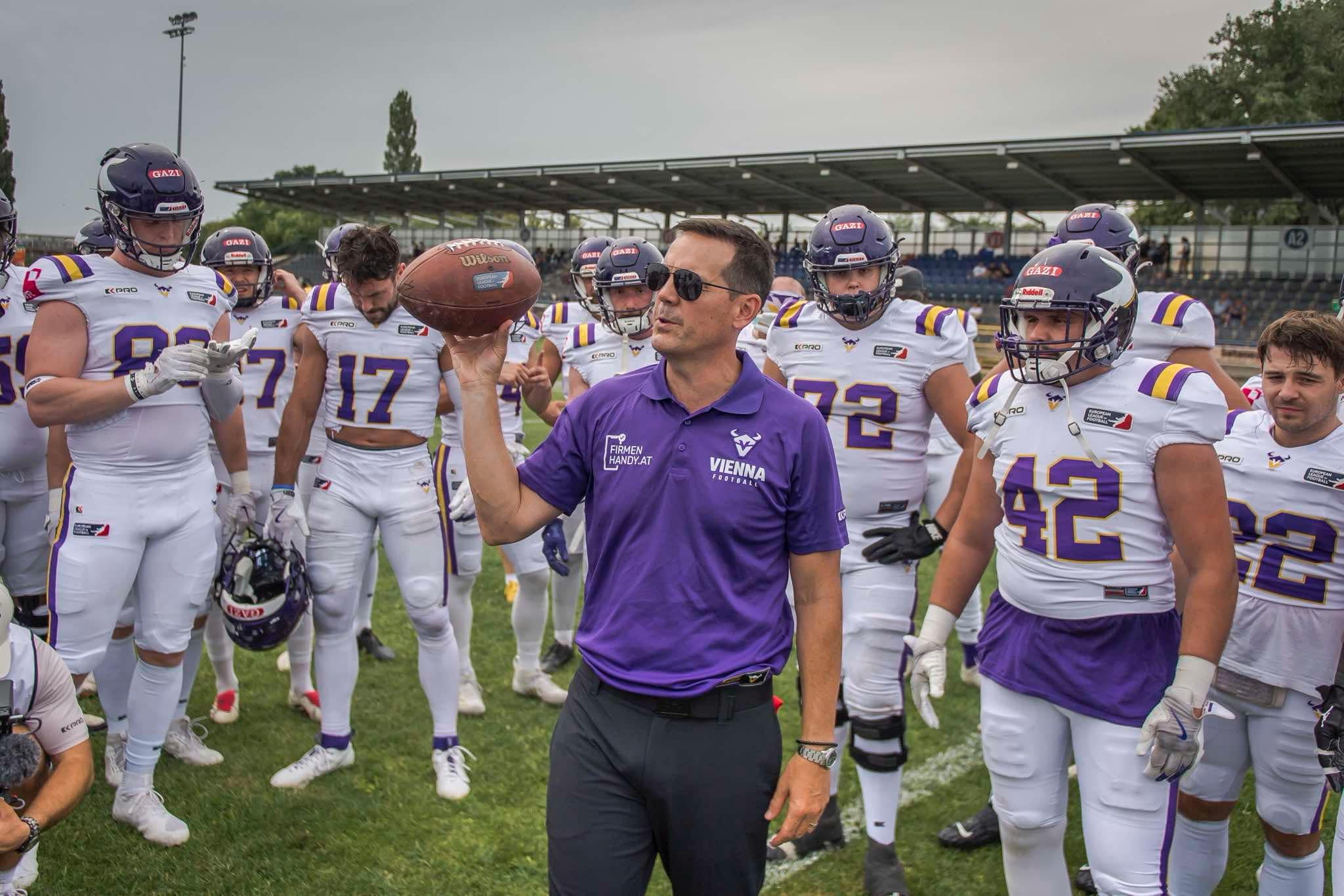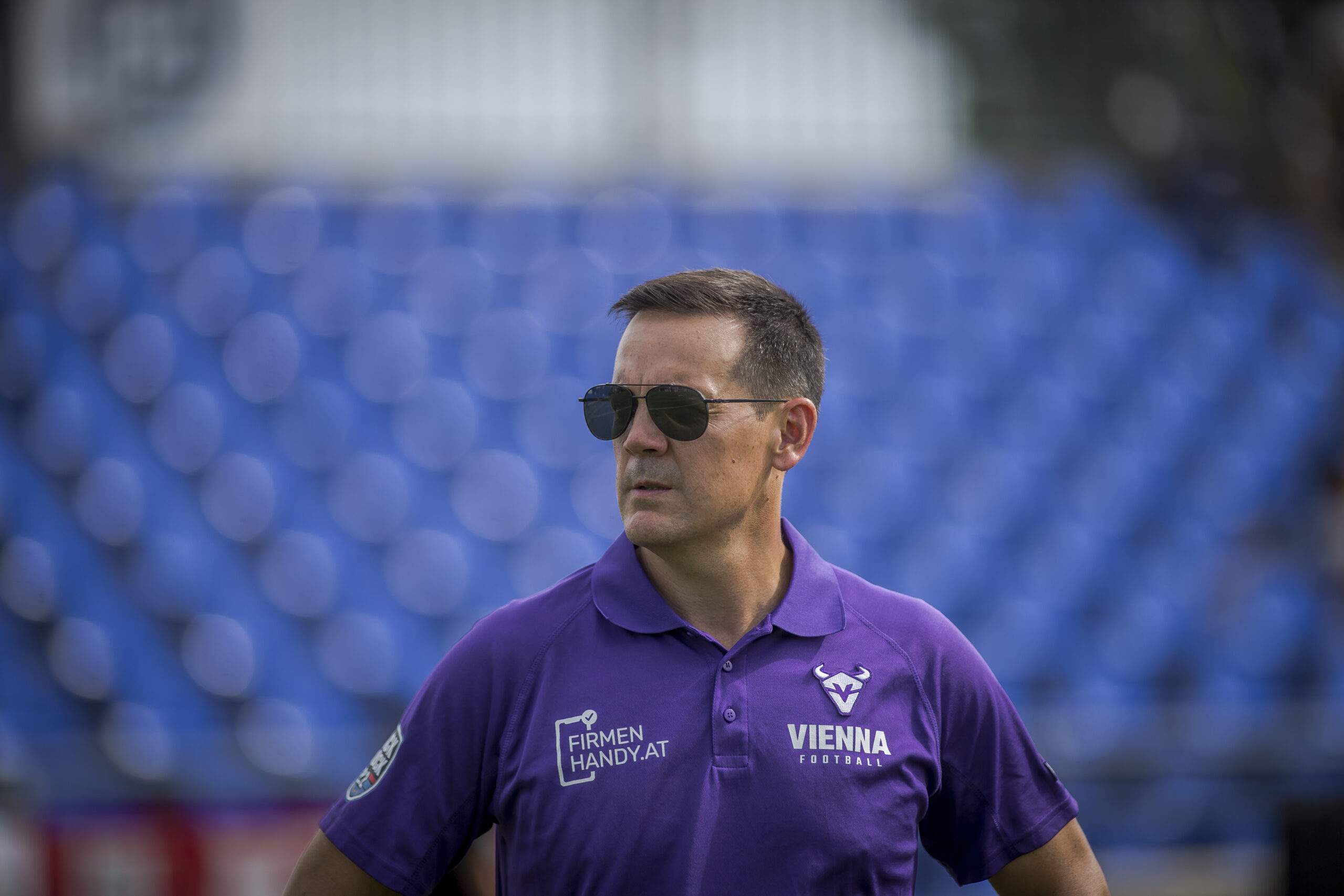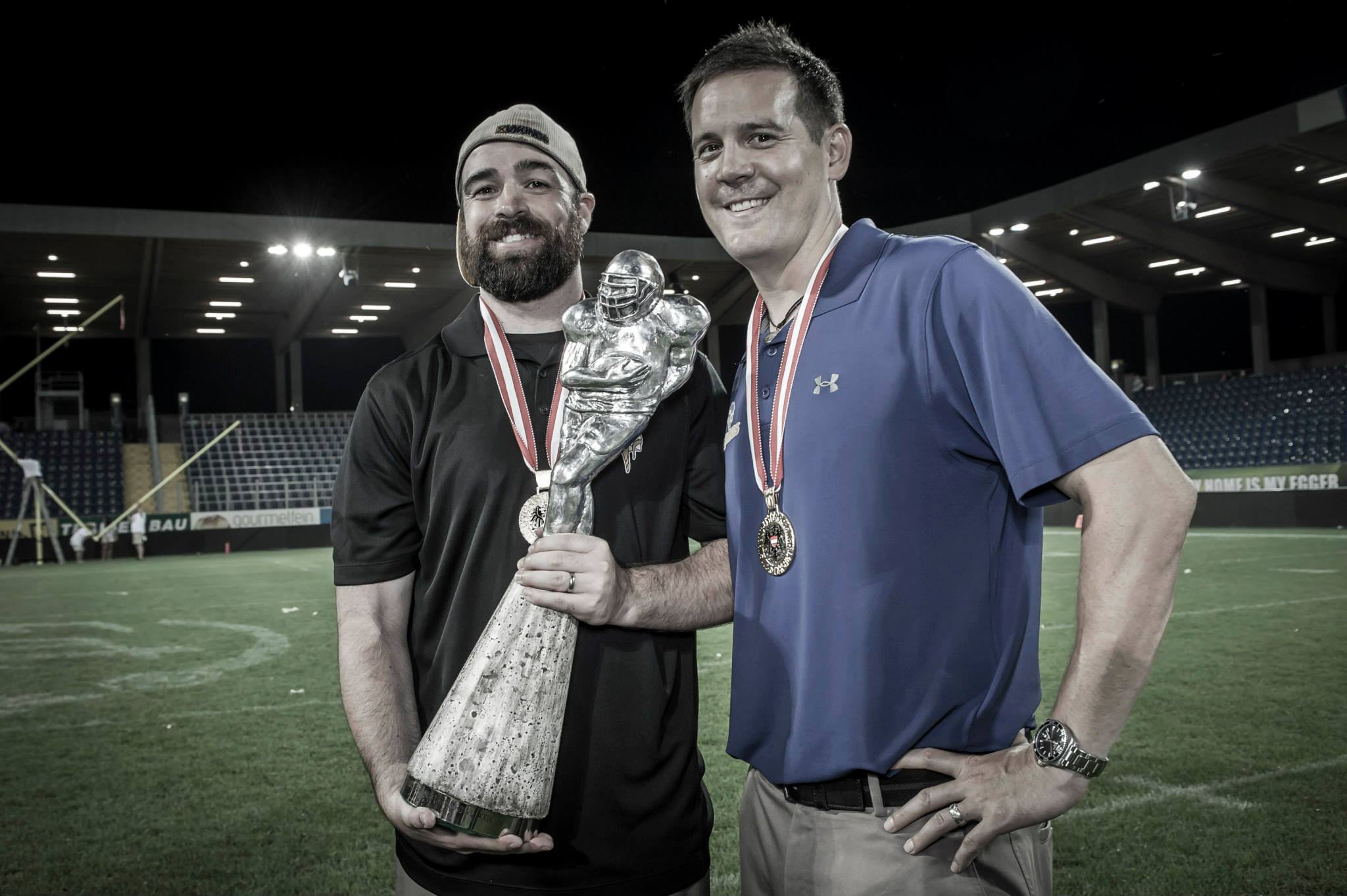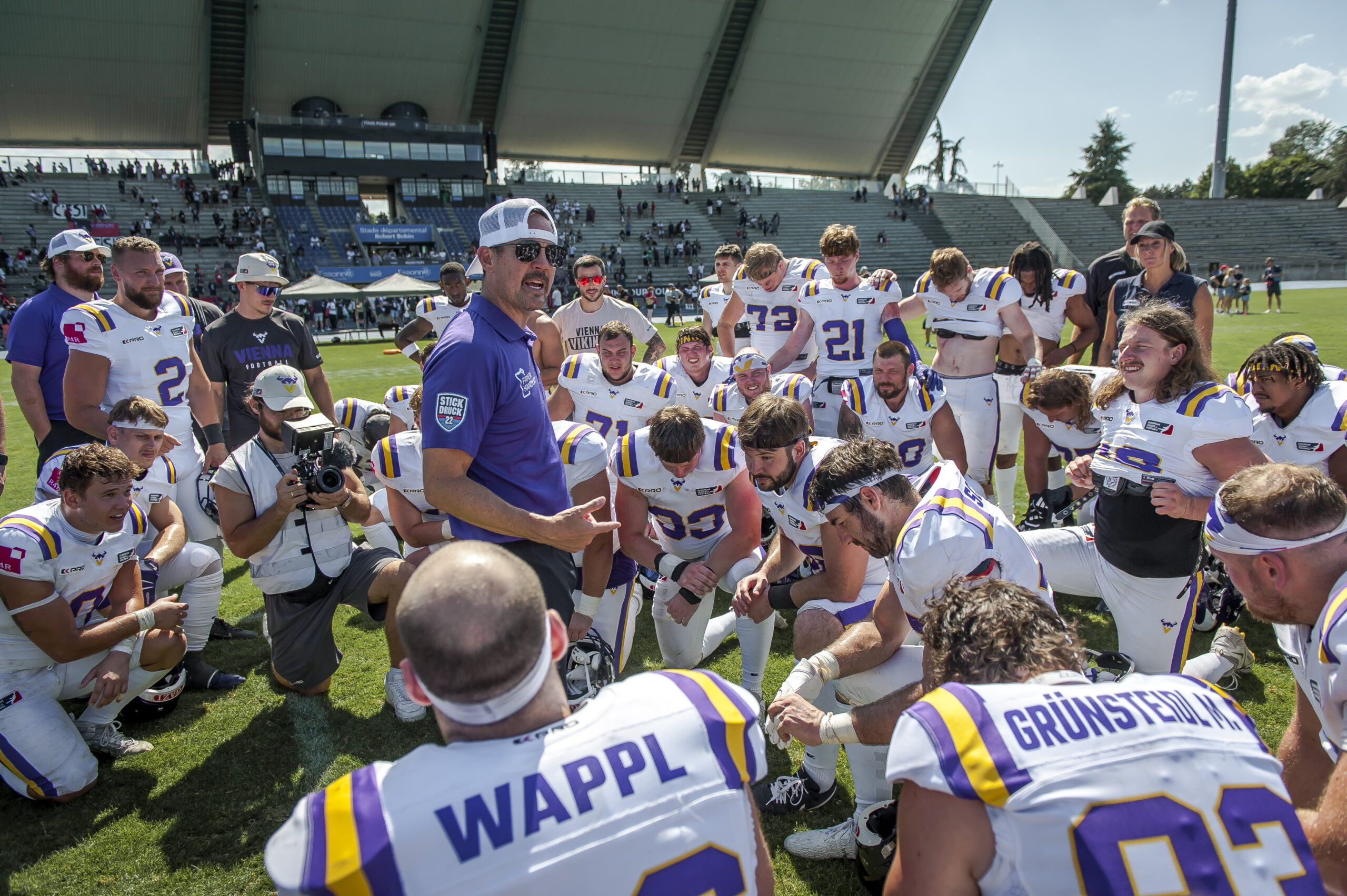Vienna Calling: Chris Calaycay’s journey to Stuttgart and a date with an old friend

In championship week, everything gets louder: bigger venue, fuller media slate, more pregame “musts.” Chris Calaycay’s answer is to turn the volume down.
“We’re not preparing for the stage—just the football game,” Vienna’s long-tenured head coach said in Thursday’s presser. Vienna will skip the league’s Saturday Honors event, travel on its normal cadence, hold the usual meetings, and keep the checklist tight: red-zone efficiency, special teams’ points, and ball security. It’s the same drumbeat that has carried the Vikings from the Austrian Football League to an ELF title in 2022, unbeaten regular seasons in 2023 and 2024, and back to the biggest stage this weekend at Stuttgart’s MHP Arena.
From Oregon to Vienna—then choosing Europe on purpose
Born in Hawaii where everyone knew how to pronounce his name correctly, Calaycay played at Willamette University, then sampled the American college game from inside the machine as a graduate assistant at Cal. The choice that followed was intentional: Europe over the D-I carousel. He returned to the Vienna Vikings in 2004, became head coach in 2007, and built one of the continent’s most consistent programs—Eurobowls (2004–07, 2013), a stack of Austrian titles, and now a second act in the ELF with Vienna’s 2022 championship. He was recognized as ELF Coach of the Year in 2024.

Photo: Hannes Jirgal
What hasn’t changed is the way he wins. In a team podcast earlier this season, Calaycay described his favorite moments not as smoke and pyros but as players celebrating each other after a big play. He talked about Fridays as the “hay is in the barn” day, bye-week golf reminding him of home, and the honesty of a work rhythm that never really shuts off in season. The details are personal; the framework is professional.
Culture that travels
The headline trait across two decades is continuity with evolution. Track the throughlines:
Staff loyalty and alignment. Calaycay name-checks assistants freely and often. The point is the standard, not the spotlight.
Imports and homegrowns, one language. Vienna has blended personalities from rival Austrian clubs and abroad into captains’ groups that set ego aside.
A development bias. When injuries hit, Vienna tends to promote from within. This season’s usage of Johannes Schütz and Leo Bauer at running back—and the reintegration of Flo Wegan—fit that pattern from the academy to the ELF sideline.
Those choices surface on Sundays as clean operation: situational discipline, hidden yards in the kicking game, and field position that gives quarterbacks like Ben Holmes high-leverage throws instead of hero-ball.
The three-phase obsession
Calaycay’s semi-final debrief was instructive. Vienna advanced, but he lingered on points left out there: a missed field goal, a blocked PAT, a dropped hold. The corrective is as old as the sport—protect the ball, finish drives, squeeze the return and punt phases for short fields—but few European teams live that message week after week like Vienna.
“Turnovers and special teams swing championships,” he said. That’s more than coach-speak. Vienna’s 2022 title run was built on exactly those margins, and the 2023/2024 regular seasons (both 12–0) were masterclasses in winning the boring things.
Neuman, the friend—and the foil

Photo: Hannes Jirgal
If championships invite “chess match” narratives, this one writes itself. Across the sideline stands Jordan Neuman, another American who embedded in European football, architected a dynasty at Schwäbisch Hall, then flipped Stuttgart Surge from winless to 10–2 and an ELF finalist in 2023 before returning to the title game at home this year.
“It won’t be diplomatic—it’ll be real because he’s one of my closest friends,” Calaycay said when asked about Neuman. The two went radio-silent the last three weeks out of respect for the moment. Years back, Calaycay even spent several days clinicking his defense to Neuman’s staff—a reminder that the European coaching fraternity is competitive and collaborative at once.
Vienna has re-watched the 2023 semi-final between the teams to refresh tendencies and tricks, but the message to players is simpler: run our stuff efficiently, protect the ball, let the routine carry the day. (The routine extends to Stuttgart’s specifics: a hybrid turf surface, big-soccer-arena slickness, sideline logistics, and a silent-count menu practiced all week.)
The pipeline question
Both coaches are emblematic of an increasingly common pathway: mid-career expats choosing Europe for stability and purpose rather than a short sabbatical. Asked whether the ELF should emphasize long-horizon coaches over marquee short-term hires, Calaycay’s answer was measured. There’s room for both. The league has already showcased big names; it has also offered the structure and visibility for coaches who intend to build. The Vikings, for their part, still tap veteran voices—Norm Chow is actively consulting with the staff and quarterback room—but the identity is Vienna’s.
The broader point, for a league still defining itself, is that club continuity wins. Vienna didn’t become Vienna by accident; it became Vienna by making daily, sometimes unglamorous decisions that accrue.

Photo: Hannes Jirgal
Health, halftime, and the minute-by-minute plan
Calaycay reported the roster is “as healthy as we can be,” with at least one key piece (“Noah”) being pushed to return after a late scratch in the semi. Vienna has a minute-accurate halftime script—now easier with a 30-minute break in the final—so adjustments don’t get swallowed by pageantry. And yes, the Vikings sold spare charter seats to fans, a tidy example of how the organization in 2025 is as capable off the field as on it.
What’s at stake—and why Vienna feels built for it
All finals are different, but the Vikings’ stance is consistent:
Treat it like a road game. Travel Saturday, meetings, walk-through, sleep, play.
Block out the periphery. Honors and hoopla can happen without them.
Own the controllables. Third downs, red zone, ball security, and kicking.
Lean on culture. The captains’ room dictates tenor as much as the play sheet does.
That approach has already delivered one ELF Championship (2022), a runner-up (2024), and a shot at another ring in Stuttgart on Sunday, Sept. 7. It’s also made Calaycay—for two decades now—one of the most reliable barometers of where European American football is headed: toward professional standards, club-level identity, and coaches who invest in a place long enough to leave it better than they found it.
